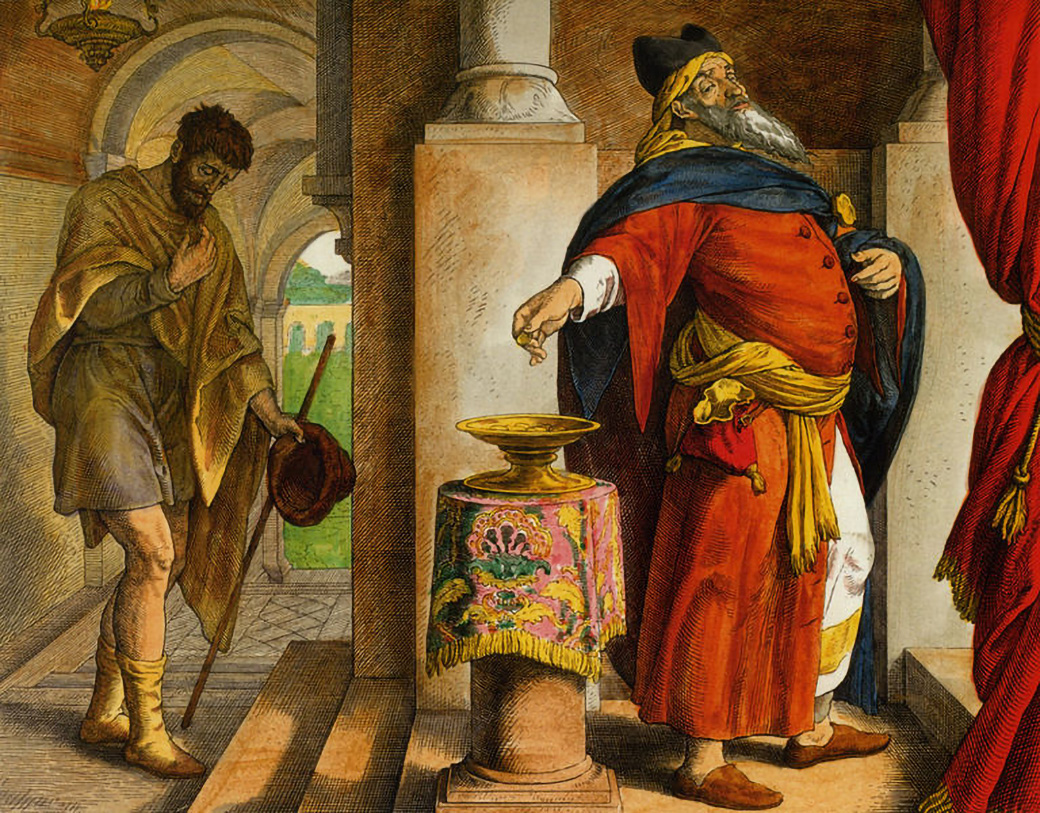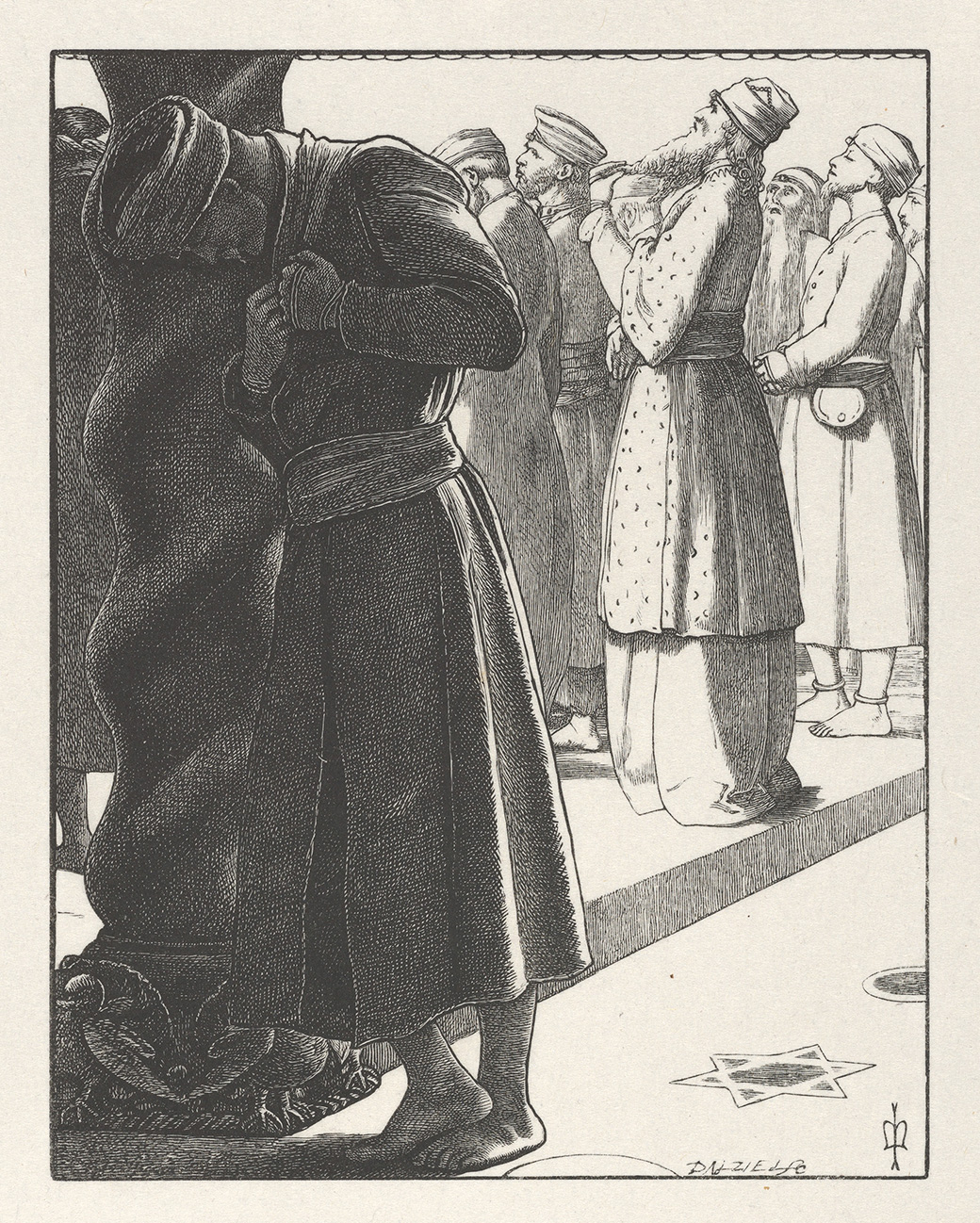Saturday in the Third Week of Lent: Hosea 6:1-6, Luke 18: 9-14.
Today’s readings give us a stunning prophecy of the Christ event some 780 years earlier and urge us to remain steadfast to the Lord in our faith and humility.
The short Book of Hosea continues to surprise me. We hear the Word of God promise his coming through the mouth of the prophet: “on the third day he will raise us up, to live in his presence.” It’s easy to understand how the Israelites could not comprehend this prophecy since they were worried more about pressures from great nations like Assyria and Egypt. As if the “third day” reference wasn’t difficult enough to understand in its specificity, there is the question of the raising up and living in his presence. The closest they might have come was to understand this in its eschatological sense of their own bodies rising after death to join God in Heaven. The mystical reality that Jesus would be the one rising and we would live in His presence sacramentally (and bodily for a few disciples) … well, that wouldn’t become clear until the event itself. But here we can see that the Word of God was speaking in its fullness of the promise much earlier in our history.
Hosea then uses some wonderful imagery from nature to urge us into right relationship with God: “let us strive to know the LORD; as certain as the dawn is his coming, and his judgment shines forth like the light of day!” I love the prophet’s faith. I love that the Lord’s coming is as “certain as the dawn.” And the light that he brings is his judgment, his truth. This is not a prophecy of the end of time (the second coming), but of Jesus’s first mission on earth that brings the times we live in now. Hosea tells us, “He will come to us like the rain, like spring rain that waters the earth.” This spring rain brings Christianity to the world.

We also hear the Lord’s slightly exasperated but caring question, “What can I do with you, Judah? Your piety is like a morning cloud, like the dew that early passes away.” The image is clear: we must be more substantial in our faith, more persistent, and not fade away so easily.
Jesus picks up this thread in the gospel reading. In another parable addressed to the Pharisees, Jesus describes their showy devotion that lacks a sincere love of God in their hearts. The Pharisee in the parable “takes up his position” in the temple, which was undoubtedly one where he could be seen clearly, and “spoke this prayer to himself.” This is a huge clue that something’s backward; prayer is always offered to God and spoken to God, whether audibly or inaudibly. The Pharisee is primarily self-focused.
This focus on himself is evident in his words. After a cursory “O God” to start his prayer, we hear the Pharisee speak of himself during the whole prayer, contrasting his law-abiding deeds with “the rest of humanity — greedy, dishonest, adulterous.” Let’s note that his window on the world, himself included, is one of judgment. Jesus is clear about not being judgemental: “Do not judge, so that you may not be judged” (Mt 7:1). We all know people who are consumed with judging themselves and others (we all probably fall into this camp at times). It is simply not compatible with being a Christian. Judging the worth of another being is something that rightfully belongs only to God. We should never try to put ourselves on par with Him. Furthermore, we know that in this life he judges us all to be worth forgiving, worth saving, worth his love. We are asked to follow His lead and offer nothing but His love to our brothers and sisters on the planet. The Final Judgment will come at the end of time, and we are the judged, not the judges in that drama.

The next item to note about the Pharisee’s off-kilter prayer is how much he speaks of himself as the agent of action. As we explored in the reflection Our Vocation to Teach the Word of God, the Word contains the fullness of communication. What a marvelous command of grammatical structure He uses to display the self-centeredness of the Pharisee. Four times we hear the Pharisee put himself as the first person subject of phrases in his prayer: “I thank you,” “I am not like,” “I fast,” and “I pay tithes.” The Pharisee has so sublimated his own sense of self-worth that, apart from being the subject of the phrases, he places himself as the grammatical agent (meaning the cause and initiator of action). This semantic idea is a great way for Jesus to make his point: it’s not just the empty show of devotion that makes the Pharisee a hypocrite, it’s his lack of conversion of heart to place the Lord first, the agent of all. This almost unconscious grammatical structuring of his prayer belies the deep perversion and reversal of order in his being.
Let’s compare this with what Jesus tells us about the tax collector: “But the tax collector stood off at a distance and would not even raise his eyes to heaven but beat his breast and prayed, ‘O God, be merciful to me a sinner.’” We hear much about his physical bearing — standing off, eyes lowered, beating his breast. This is the stance of supplication. It reminds us of the great supplication offered for days by Esther in order to save the Israelites in Babylonia (see Esther: Model of How to Petition the Father).
The tax collector’s prayer itself is so fundamentally correct that it forms the proto-Jesus Prayer. In this prayer, Jesus gives us another example of how to pray correctly (in addition to the Lord’s Prayer, which he gives us as well). Let’s dissect it: the tax collector approaches in supplication, addresses God as the agent of action in the world (he says “merciful to me,” and as such he is the object of action, not the agent), and identifies himself as a sinner in need of mercy. We have reflected upon the importance of mercy as one of God’s great attributes that sets Him above the rest of Creation (see Mercy is the Master Principle). As we start to comprehend that mercy is an important aspect of God’s love (agape), which is given to us in order to live beyond us as we give it to others, we can see that asking for mercy is a way to return to the wellspring of life-giving water. This can and should be our perpetual prayer as Christians.

And Jesus has given us a much deeper, intimate communion with this wellspring in the form of the liturgy where we can sacramentally bring into our bodies the mercy and love flowing from the Lord’s pierced heart. This brings us to the Jesus Prayer: “Lord Jesus Christ, Son of God, have mercy on me, a sinner.” Praying to the second Person of the Trinity, our great high priest and chief intercessor who descended to earth to dwell and suffer with us, is a key gift in our Christian lives. The Catechism of the Catholic Church teaches us, “The name ‘Jesus’ contains all: God and man and the whole economy of creation and salvation. To pray ‘Jesus’ is to invoke him and to call him within us. His name is the only one that contains the presence it signifies” (2666).
Thus, the Jesus Prayer unites the same correctness of prayer we find in the tax collector with the new reality that Christ brought to history with his death and Resurrection. The Jesus Prayer is powerful and draws us deeper into the mystery of being a part of the Church. “When the holy name is repeated often by a humbly attentive heart, the prayer is not lost by heaping up empty phrases, but holds fast to the word and ‘brings forth fruit with patience.’ This prayer is possible ‘at all times’ because it is not one occupation among others but the only occupation: that of loving God, which animates and transfigures every action in Christ Jesus” (CCC, 2668).
What better time than Lent, in its stillness and silence, to repeat the Jesus Prayer and let it sink in to transform our hearts? Let us take Jesus’s instruction to be like the tax collector in the parable and not the Pharisee. Let us take the Church’s instruction to pray in Jesus’s name as we ask God for mercy in the light of our infidelities and sins.
For we know, as certain as the dawn, He will come.